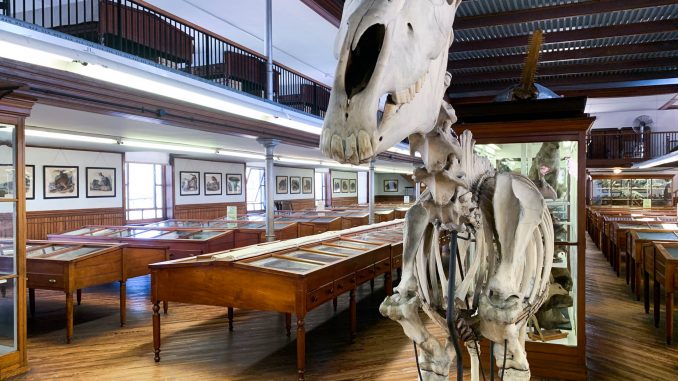
The Wagner Free Institute of Science of Philadelphia, on Montgomery Avenue near 17th Street, reopened on April 3 after it closed more than a year ago because of COVID-19 restrictions.
The Wagner Institute will be open every Wednesday from 12:30 p.m. to 5 p.m. and select weekend days, including April 18, May 1 and May 15 from 12 p.m. to 4:30 p.m., through the end of May, said Aaron Lawson, the Wagner Institute’s museum educator and a 2012 Temple University geology alumnus.
The Wagner Institute is a natural history museum with more than 100,000 specimens on display, according to the museum’s website.
John McArthur, the architect who designed City Hall, designed the Wagner Institute’s building, which was completed in 1865. The museum has offered free adult science education programs for more than 160 years, making it the oldest program of its kind in the United States, according to the museum’s website.
The Wagner Institute first closed on March 16, 2020, because of the COVID-19 pandemic, said Susan Glassman, director of the institute.
The Wagner Institute’s second floor, which holds many of its specimens, is open to the public, but the restrooms and gift shop are closed to the public, said Holly Clark, director of children’s education at the Wagner Institute.
While other museums, like the Philadelphia Museum of Art, reopened in January, the Wagner Institute waited until April because the city’s cleaning requirements for disinfecting businesses for COVID-19 are challenging for historic buildings, Glassman said.
“We have all this historic woodwork, we can’t use certain kinds of harsh cleaning agents on them,” Glassman said.
The Wagner Institute is not open for multiple days in a row because it would require the use of harsh cleaning agents, Glassman added.
Philadelphia requires businesses open to the public to clean all regularly touched surfaces and disinfect the building using a disinfectant registered with the Environmental Protection Agency, according to the city’s guidelines.
The Wagner Institute is now requiring tickets for entry, but there is no required cost, and the Institute is encouraging visitors to contribute a suggested donation of $5 to $10 to enter. The museum is limiting visitor time to 90 minutes and 50 visitors at a time, Glassman said.
The Wagner Institute encourages visitors to register for access online at Eventbrite because it allows the museum to manage visitor capacity better, but it will still allow walk-in visitors as well, Glassman added.
Fewer people have visited the Wagner Institute since it reopened, but Glassman expects more visitors as word spreads about its reopening, she said.
“Numbers will increase as people know that we’ve reopened and also as people get, hopefully, eventually, more comfortable with coming back into public spaces,” Glassman added.
The Wagner Institute has five employees who rotate between working in person at the museum and online with virtual field trips and lectures, Clark said.
At the start of the COVID-19 pandemic, the Wagner Institute began offering virtual programming, like museum tours, public lectures and virtual field trips, on Zoom, Glassman said.
The Wagner Institute used Zoom to continue its science programming with local schools and schools in the Greater Philadelphia area, Lawson said.
“It’s definitely been a great substitute,” Lawson said. “It’s been something that is more engaging than even I especially ever thought. That was something that I was super nervous about.”
In the past, Temple students took field trips to the Wagner Institute for intellectual heritage classes studying Charles Darwin and Tyler School of Art and Architecture students sketching specimens, Clark said.
On April 18, the Wagner Institute will participate in Reopen House Day, a citywide event for Philadelphia’s National Historic Landmarks, which the museum is a part of, Glassman said.
The Wagner Institute will host in-person activities, like an exhibit about the construction of the museum’s building and a virtual Zoom talk between Glassman and Kathy Haas, director of historical resources at Girard College, about the history and connection between the Wagner Institute and Girard College on April 18, Glassman said.
The Wagner Institute’s days and hours of operation are set through May, but they could change for the summer and fall, Clark said.
“If we get closer to herd immunity, we will reevaluate for the summer,” Clark said.
CORRECTION: A previous version of this story inaccurately stated the cost of entrance to the Wagner Institute. The institute’s prices are a recommendation, but they are not required for entry. This article and its headline have been updated to reflect this.


Be the first to comment